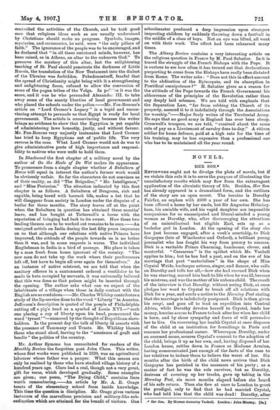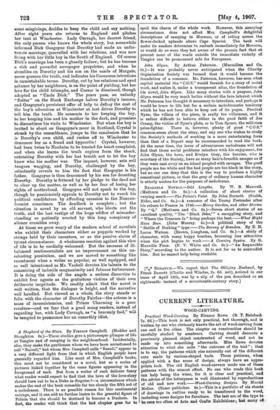NOVELS.
HER SON.*
RIIVIEWER8 ought not to divulge the plots of novels, but if we violate this rule it is to serve the purpose of illustrating the unsatisfactory results which may flow from the extravagant application of the altruistic theory of life. Besides, Her Sara has already appeared in a dramatised form, and the outlines of the story are an open secret. The heroine is Dorothy Fairfax, an orphan with £600 a year of her own. She has been offered a home by her uncle, but Sir Augustus Helming- ham, his amiable wife, and his vapid daughter are impossible companions for so emancipated and liberal-minded a young woman as Dorothy, who, after discouraging the attentions of an unintellectual but eligible Earl, sets up as a bachelor girl in London. At the opening of the story she has just become engaged, after a week's courtship,. to Dick Gasgoyne (late of Winchester and Oxford), a brilliant young journalist who has fought his way from penury to success. Dick is a veritable Prince Charming, handsome, clever, and masterful. " Caesarean" is the epithet which Mr. Vachell applies to him ; but he has had a past, and on the eve of his marriage that past "materialises" in the shape of Miss Crystal Wride, burlesque actress, singer, and dancer, who calls on Dorothy and tells her all,—how she had rescued Dick when he was starving, nursed him back to life when be was ill,become his mistress, and was the mother of his unborn child. The result of the interview is that Dorothy, without seeing Dick, at once pledges her word to Crystal to break off all relations with Dick for a year, and sends a notice to the Morning Post stating that the marriage is indefinitely postponed. Dick is then given his conga, and goes off to lead an expedition into Central Africa, while Dorothy devotes herself to Crystal, lends her money, hurries across to France to look after her when her child is born, and by sheer sympathy and force of will persuades her to live. On recovering her health Crystal at once disposes of the child at an institution for foundlings in Paris and resumes her profeseional career. Whereupon Dorothy, under an assumed name, secures Crystal's consent to the adoption of the child, brings it up as her own, and, having disposed of her London house, settles down in France as Madame Armine, having communicated just enough of the facts of the case to her relatives to induce them to believe the worst of her. Six months after the birth of the child news arrives that Dick Gasgoyne has perished in the massacre of his party ; as a matter of fact he was the sole survivor, but as Dorothy, desirous of covering up her tracks, gave up taking in the Morning Post, six more months elapsed before she heard of his safe return. Then she flew at once to London to greet the prodigal, only to find that he had married Crystal, who had told him that the child was dead 1 Dorothy, after * Her Son. /3y_HozsavAnnesley Vachell. London, John Maar. NO
some misgivings, decides to keep the child and say nothing. After eight years she returns to England and pitches her tent at Winchester. Lady Curragb, her dearest friend, the only person who knows the whole story, has meanwhile informed Dick Gasgoyne that Dorothy had made an unfor- tunate marriage, quarrelled with her relations, and was now living with her little boy in the South of England. Of course Dick's marriage has been a ghastly failure; but he has become a rich and powerful newspaper proprietor, and when be stumbles on Dorothy and his son on the sands of Margate, never guesses the truth, and indicates his Caesarean intentions in unmistakable terms. Dorothy, cut by her relations and eyed askance by her neighbours, is on the point of yielding, but her love for the child triumphs, and Caesar is dismissed, though adopted as "Uncle Dick." The years pass, an unlucky "flutter" on the Stook Exchange halves Dorothy's income, and Gasgoyne's persistent offer of help to defray the cost of the boy's education at Winchester at last drives Dorothy to tell him the truth. He consents to her keeping the boy, to her keeping him and his mother in the dark, and promises to discontinue his visits to Winchester. But when the boy is invited to shoot on Gasgoyne's moor in Scotland, Crystal is struck by the resemblance, jumps to the conclusion that he is Dorothy's own child, and rushes off to Winchester to denounce her as a fraud and hypocrite ! Crystal, however, had been twice to Nauheim to be treated for heart complaint, and when she learns the truth expires from the shock, entreating Dorothy with her last breath not to let the boy know who his mother was. The inquest, however, sets evil tongues wagging, and Dorothy, challenged by the boy, reluctantly reveals to him the fact that Gasgoyne is his father. Gasgoyne is then denounced by his son for deserting Dorothy. Dorothy is fettered by her pledge to the dead not to clear up the matter, as well as by her fear of losing her rights of motherhood. Gasgoyne will not speak to the boy, though he passionately appeals to Dorothy not to wreck his political candidature by affording occasion to the Noncon- formist conscience. The deadlock is complete ; but the situation is saved by an old servant, who blurts out the truth, and the last vestige of the huge edifice of misunder- standing so patiently erected by this long conspiracy of silence crumbles away.
At times we grow weary of the modern school of novelists who exhibit their characters either as puppets worked by strings beld by their ancestors, or as the passive slaves of tyrant circumstance. A wholesome reaction against this view of life is to be cordially welcomed. But the excesses of ill- balanced sentimentalists are no improvement on this un- relenting pessimism, and we are moved to something like resentment when a writer so popular, so well equipped, and so well intentioned as Mr. Vachell devotes his talents to the canonising of imbecile magnanimity and fatuous forbearance. It is doing the side of the angels a serious disservice to exhibit free agents as the gratuitous victims of their own deliberate ineptitude. We readily admit that the novel is well written, that the dialogue is bright, and the narrative well handled. But viewed as a whole, the story stands or falls with the character of Dorothy Fairfax—the actress is a mass of inconsistencies, and Prince Charming is a poor creature—and we fear that a good many readers, instead of regarding her, with Lady Corragh, as "a heavenly fool," will be tempted to pronounce her an unearthly idiot.















































 Previous page
Previous page